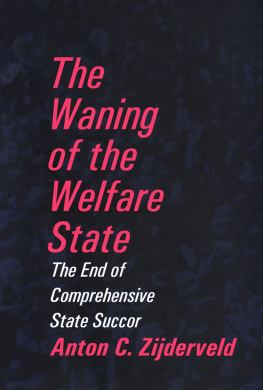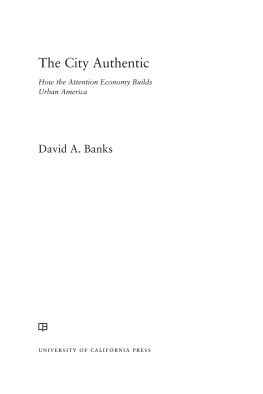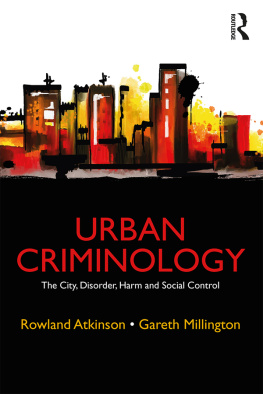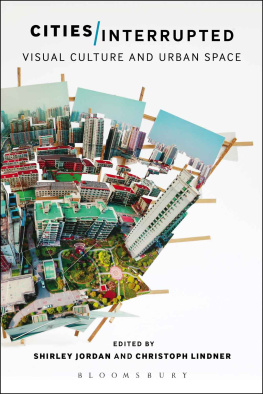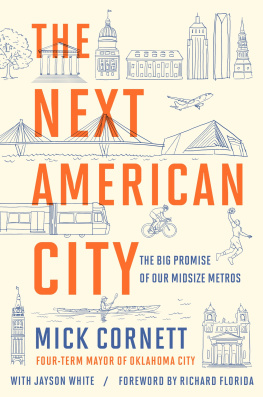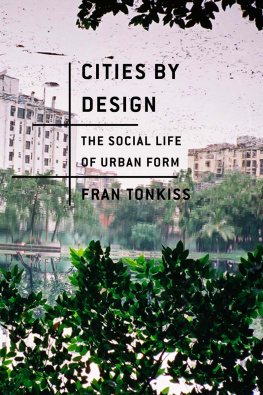First published 1998 by Transaction Publishers
Published 2017 by Routledge
2 Park Square, Milton Park, Abingdon, Oxon OX14 4RN
711 Third Avenue, New York, NY 10017, USA
Routledge is an imprint of the Taylor & Francis Group, an informa business
Copyright 2009 by Taylor & Francis
All rights reserved. No part of this book may be reprinted or reproduced or utilised in any form or by any electronic, mechanical, or other means, now known or hereafter invented, including photocopying and recording, or in any information storage or retrieval system, without permission in writing from the publishers.
Notice:
Product or corporate names may be trademarks or registered trademarks, and are used only for identification and explanation without intent to infringe.
Library of Congress Catalog Number: 97-26786
ISBN: 978-1-4128-0820-0
Library of Congress Cataloging-in-Publication
Zijderveld, Anton C., 1937-
[Steden zonder stedelijkheid. English]
A theory of urbanity : the economic and civil culture of cities / Anton C.
Zijderveld.
p. cm.
Rev. translation of the author's Steden zonder stedelijkheid.
Includes bibliographical references and index.
ISBN 1-56000-317-0 (alk. paper)
1. City planningNetherlands. 2. Urban policyNetherlands. 3. City planning. 4. Urban policy. I. Title.
HT169.N4Z5413 1997
307.7609492dc21
97-26786
CIP
In the 1980s organizational culture became a much debated issue in the areas of public and business administration. It is generally viewed as the hardly quantifiable source of social and economic energy which is essential to the organization's performance. In comparison there is still little reflection and discussion about urban culture. What is it that keeps a city going economically, socially, and politically, despite all its diversities and fragmentations? What is it that makes a city, despite its often chaotic appearance, into a meaningful order that some people love and identify with, yet others loath and reject as the source of multiple evils? This book tries to discuss and answer these and related questions. The concept urbanity is used throughout as synonym for urban culture.
This book is a complete overhaul of an earlier Dutch publication. It was some ten years ago that an enlightened civil servant of the Dutch Ministry for Housing Affairs asked me to write an essay on the culture of cities with the explicit request not to repeat all the well-known theorems and concepts of mainstream urbanologists. It is strange, he said to me, that the two well-known and eternally criticized essays on urbanism by Wirth and Simmel are still very readable. You find them in almost every urban sociology reader. Substantively and methodologically, they may have been wrong, he went on, but unlike many present-day urban specialists, they managed to put life in the big cities into perspective.
This was, I still believe, a wise observation, because Wirth, Simmel, and others, like Redfield, Mumford, and Jacobs, may indeed lack methodological and empirical sophistication, yet after one reads their publications carefully, one begins to look at cities, and at the people living and working within them, differently. It is as if they, unlike most of today's urbanologists, somehow put the qualitative dimensions of urban life into focus. They caught, so to say, its pulse, its rhythm, its cultural infrastructure, maybe even its meaning.
The above-mentioned civil servant asked me to put things into the proper theoretical perspective and to offer him and his colleagues something to ponder. The study should not be burdened with learned expositions of the urbanological discourse, nor be hindered by the standard methodological and theoretical demands of urban sociology. I was not even allowed to worry in advance about my study's possible applicability to issues of public policy. That, of course, was quite remarkable, since all research contracted by government agencies usually ought to contribute in the end to the solving of social and economic problems. The civil servant in this case believedand that is why I called him enlightened beforein the rather indirect usefulness and applicability of theory: it puts things into a perspective that renders practical policies and the problems to be addressed more rational in a substantive manner. Policy may in this way even end up being more effective and more efficient.
I fully shared these conceptions of theory and policy, complied with his wish, and sat down to read the classics on the city once again. But I also plunged head first into the ocean of urbanological publications, some of which were helpful and enlightening. I completed the manuscript rather hastily within six months. (This was the only concession I had to grant to the policy makers who apparently are always in a hurry.) I began the treatise, as I shall do in this essay, with Max Weber's theory of the city as developed in Economy and Society, and in his seminal series of lectures, published posthumously as Economic History. But I also dealt with the anti-urban animus which is, in my view then and now, fostered by state centralization and in particular by a centralized and interventionist welfare state. In view of the Dutch welfare state, still thriving in the beginning of the 1980s, I called my little book programmatically (translated) Cities without Urbanity.
I have always wanted to rewrite and expand this Dutch essay, particularly since I became acquainted with Peter L. Berger's concept of economic culture. I realized that this concept which evidently belongs to the tradition of Institutional Economics (Weber, Sombart, Veblen, Schumpeter, Malinowski, Jacobs, etc.), would help to strengthen the notion of urbanity as I developed it in my short Dutch study. However, I soon discovered that the concept of urbanity should also be tied to the concept of civic culture as developed in the sixties by Almond and Verba. It ties in, of course, with the present debates on civil society. Urbanity, I shall argue, has been, from its start at the end of the Middle Ages in Europe, an economic as well as civic culture, and as such the source of energy and inspiration for Western urban democracythe prime example of a truly civil society.
There was still another reason for a complete overhaul of the Dutch essay. During the 1980s the (predominantly post-modernist) argument gained prominence that the idea of the city as a distinct phenomenon is outdated in view of a world which has become increasingly fragmented and borderless, if not limitless, and highly flexible due to the seminal impact of electronic technologies. Consequently, it is argued, the notion of a specifically urban culture has become superfluous. We have allegedly entered the age of cyberspace and virtual reality, the informational society that is no longer characterized by more or less fixed structures and a centered order. Informational society and the informational city of today are rather characterized by incessant flows, by mobilities of sorts, by decentered fragmentations. In this new world, the idea of the city, let alone of urbanity, is, it is believed, meaningless. In view of such urban behemoths like Los Angeles, often professed as the model for urban life in the twenty-first century, but also in view of the recent evolution of suburbia, in particular the rapid emergence of so-called


